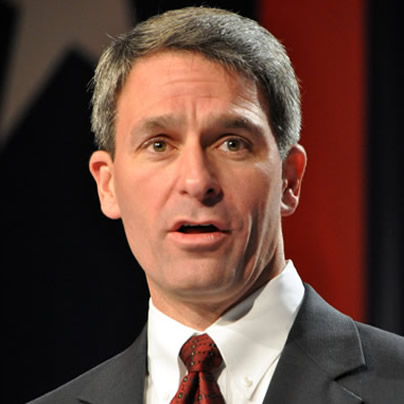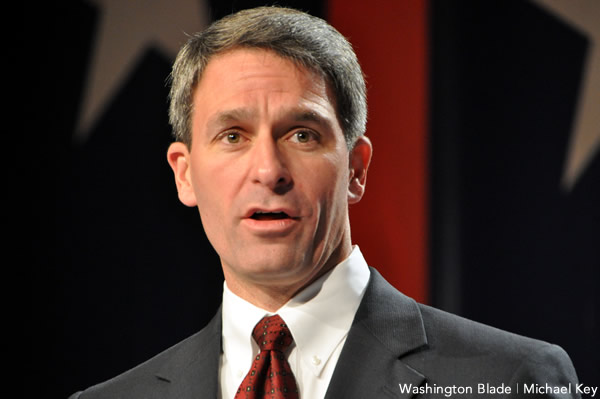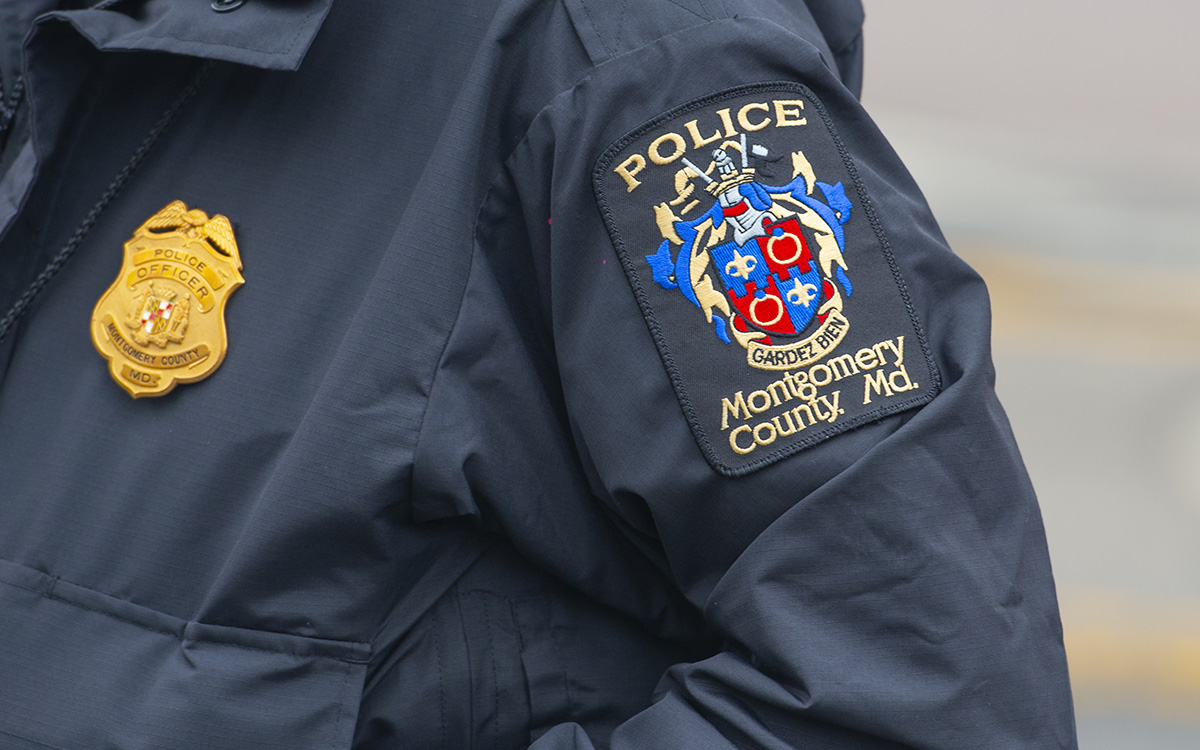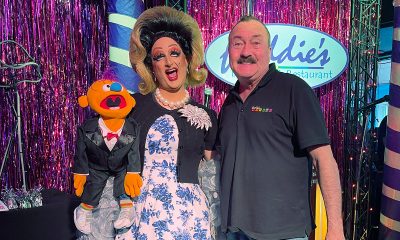Local
Supreme Court denies Cuccinelli appeal of Va. sodomy law ruling
Action upholds lower court ruling striking down law


The high court declined to hear a case brought by Virginia Attorney General Ken Cuccinelli related to the commonwealth’s sodomy law. (Washington Blade file photo by Michael Key)
The U.S. Supreme Court on Monday denied a petition by Virginia Attorney General Ken Cuccinelli seeking to appeal a lower court ruling declaring the state’s Crimes Against Nature or sodomy law unconstitutional.
By refusing to hear the case, the high court allowed a decision in March striking down the law by the Fourth Circuit U.S. Court of Appeals in Richmond to stand, ending efforts by Cuccinelli and other officials to get the state’s ban on oral and anal sex between consenting adults reinstated.
“Under any circumstances this is definitely a victory and it’s a good one,” said Claire Gastanaga, executive director of the ACLU of Virginia. “It puts to rest this idea that somehow you can have a statute that’s found unconstitutional but you can still be prosecuted under it.”
Gastanaga was referring to the Supreme Court’s landmark 2003 decision of Lawrence v. Texas that overturned state sodomy laws. A three-judge panel of the Fourth Circuit Court of Appeals cited the Lawrence decision as the basis for its decision in March to overturn Virginia’s Crimes Against Nature statute, saying it could no longer be enforced under any circumstances.
Cuccinelli has contended that the Lawrence decision doesn’t apply to cases involving sex between adults and minors. As a candidate for governor, Cuccinelli launched a special campaign website earlier this year claiming removal of the sodomy law would prevent law enforcement officials from prosecuting “child predators.”
LGBT rights attorneys have disputed that claim, saying existing state laws enable police and prosecutors to arrest and prosecute anyone who sexually abuses a minor.
The Fourth Circuit appeals court decision struck down a felony conviction by a judge in the city of Colonial Heights, Va., of a 47-year-old man for soliciting oral sex from a 17-year-old woman. Although no sex took place, the defendant, William Scott MacDonald, had been charged with soliciting someone to commit a sexual act that his attorneys argued was no longer illegal under the Lawrence decision.
In its 2-1 ruling, the appeals court panel declared that the Lawrence decision invalidated the Virginia Crimes Against Nature law as “facially” unconstitutional, preventing it from being enforced, even in cases of consensual sodomy between an adult and a minor if the minor is between the ages of 15 and 18. The judges noted that the age of sexual consent in Virginia is 15.
Cuccinelli’s office issued a statement on Monday saying the elimination of the sodomy law “puts tools prosecutors need to protect children in jeopardy.”
According to the statement, Cuccinelli’s efforts to keep the law on the books “was never about sexual orientation or private acts between consenting adults” but instead was about enabling law enforcement officials to “prosecute child predators.”
Attorneys familiar with the case — including prosecutors in Arlington and Alexandria — have said existing state laws give law enforcement officials the ability to prosecute all cases of forcible or coerced sex between an adult and a minor as a felony. They say that heterosexual intercourse between a minor within the age range of 15 through 17 and an adult can still be prosecuted as a misdemeanor. But with the elimination of the state sodomy law, consenting oral or anal sex among minors — gay or straight — between age 15 and 17 and an adult is fully legal and can’t be prosecuted until or unless the legislature changes the law.
Gastanaga and others familiar with Cuccinelli’s concerns have called on the Virginia General Assembly to revise the existing laws addressing the age of consent or sex with minors in a way that doesn’t violate the Constitution as spelled out in the Lawrence decision.
“That means you’ve got to do the hard work of getting together with the Commonwealth’s Attorneys and public defenders and other criminal defense lawyers and legislators and people like us and try to work out something that does address what you want to address, which is sexual activity that is not constitutionally protected,” Gastanaga said.
James Parrish, executive director of the statewide LGBT group Equality Virginia, said his organization would not oppose legislation that reforms existing laws to address potential problems resulting from the striking down of the sodomy law.
“This is something the Supreme Court decided now more than 10 years ago,” Parrish said. “We understand that the attorney general and others have some concerns of how the sodomy law was intertwined with other laws. They have had 10 years to make those laws more clear and we would hope they would work with the General Assembly to address these concerns” in a way that doesn’t violate the Lawrence decision’s protections pertaining to consenting adults, he said.
Although Cuccinelli criticized his Democratic opponent, businessman Terry McAuliffe, for expressing support for overturning the Virginia sodomy law, McAuliffe was leading Cuccinelli by a 42 to 37 percent margin in one of the most recent public opinion polls conducted by Virginia’s Hampton University.
Josh Schwerin, McAuliffe’s press secretary, said Cuccinelli demonstrated “an extreme agenda and uncompromising approach” by refusing in the past to support legislation to update Virginia’s laws to conform to the Supreme Court ruling on sodomy.
“Everyone supports strong laws to protect children and, like most Virginians, Terry believes our law should be updated to both conform with court rulings and allow prosecution of predators,” Schwerin said. “As he admitted as recently as 2009, Ken Cuccinelli is one of the only elected officials in America who believes that being gay should result in criminal prosecution and jail time,” he said.
Under the Supreme Court’s rules, at least four of the court’s nine justices must vote to hear a case in order for the court to consider a case on its merits. The court never discloses how individual justices vote or what the vote count was when it decides whether or not to take a case.
However, in August Supreme Court Chief Justice John Roberts issued a ruling denying a separate petition by Cuccinelli asking the court to put a stay on the Fourth Circuit Court of Appeals ruling striking down the Virginia sodomy law until the Supreme Court decided whether or not to take the case. Roberts did not issue an explanation for denying Cuccinelli’s request for a stay.
Maryland
Montgomery County police chief discloses details behind arrest of 18-year-old trans student charged with plans to commit school shooting
County executive tells news conference student’s trans identity is irrelevant to criminal charge

Montgomery County, Md., Police Chief Marcus Jones joined other county and law enforcement officials at a news conference on Friday, April 19, to provide details of the police investigation and arrest of an 18-year-old high school student charged two days earlier with threats of mass violence based on information that he allegedly planed a mass shooting at the high school and elementary school he attended in Rockville, Md.
In charging documents and in a press released issued on April 18, Montgomery County identified the arrested student as “Andrea Ye, of Rockville, whose preferred name is Alex Ye.”
One of the charging documents states that a friend of Ye, who police say came forward as a witness who played a crucial role in alerting authorities to Ye’s threats of a school shooting, noted that Ye told the witness that Ye identified as the transgender student he wrote about as character in a 129-page manifesto outlining plans for a school shoot. Police have said Ye told them the manifest was a fictional story he planned to publish.
At the news conference on Friday, Police Chief Jones and other law enforcement officials, including an FBI official and Montgomery County Executive Marc Elrich, referred to the student as Alex Ye and Mr. Ye. None of the officials raised the issue of whether Ye identified as a transgender man, seven though one of the police documents identifies Ye as a “biological female.”
County Executive Elrich appeared to express the views of the public officials at the news conference when one of the media reporters, during a question-and-answer period, asked Elrich why he and the others who spoke at the news conferment to “admit that this individual was transgender.”
“Because it’s not a lead,” Elrich replied, asking if the press and law enforcement authorities should disclose that someone arrested for murder is “a white Christian male who’s heterosexual.” Elrich stated, “No, you don’t – You never publish somebody’s sexual orientation when we talk about this. Why you are focusing on this being a transgender is beyond me. It’s not a news story. It is not a crime to be transgender.”
The reporter attempted to respond but was cut off by the press conference moderator, who called on someone else to ask the next question.
In his remarks at the press conference Chief Jones praised the so far unidentified witness who was the first to alert authorities about Ye’s manifesto appear to make threats of a mass school shooting.
“Now, this is a situation that highlights the critical importance of vigilance and community involvement in preventing potential tragedies,” Jones said. I commend the collaborative efforts of the Montgomery County Police Department, the Federal Bureau of Investigation, the Rockville City Police Department, and the Montgomery County Public Schools, as well as Montgomery County Health and Human Services,” he told the gathering.
“Thanks to their swift action and cooperation a potentially catastrophic event was prevented,” Jones said.
Jones pointed out that during the current school year, police have received reports of 140 threats to the public schools in Montgomery County. He said after a thorough investigation, none of them rose to the level where an arrest was made. Instead, police and school officials took steps to arrange for the student making the threats and their parents take remedial action, including providing mental health services.
“But this case is different,” Jones said. “This case is entirely different that takes it to a different level. It was a concerned witness who brought this matter to light by rereporting the suspect’s manifest to authorities. This underscores the value of community engagement and the ‘see something say something’ approach,” he said.
Maryland
Rockville teen charged with plotting school shooting after FBI finds ‘manifesto’
Alex Ye charged with threats of mass violence

BY BRETT BARROUQUERE | A Montgomery County high school student is charged with what police describe as plans to commit a school shooting.
Andrea Ye, 18, of Rockville, whose preferred name is Alex Ye, is charged with threats of mass violence. Montgomery County Police and the FBI arrested Ye Wednesday.
The rest of this article can be found on the Baltimore Banner’s website.
District of Columbia
New D.C. LGBTQ+ bar Crush set to open April 19
An ‘all-inclusive entertainment haven,’ with dance floor, roof deck

D.C.’s newest LGBTQ+ bar called Crush is scheduled to open for business at 4 p.m. on Friday, April 19, in a spacious, two-story building with a dance floor and roof deck at 2007 14th St., N.W. in one of the city’s bustling nightlife areas.
A statement released by co-owners Stephen Rutgers and Mark Rutstein earlier this year says the new bar will provide an atmosphere that blends “nostalgia with contemporary nightlife” in a building that was home to a popular music store and radio supply shop.
Rutgers said the opening comes one day after Crush received final approval of its liquor license that was transferred from the Owl Room, a bar that operated in the same building before closing Dec. 31 of last year. The official opening also comes three days after Crush hosted a pre-opening reception for family, friends, and community members on Tuesday, April 16.
Among those attending, Rutgers said, were officials with several prominent local LGBTQ organizations, including officials with the DC Center for the LGBTQ Community, which is located across the street from Crush in the city’s Reeves Center municipal building. Also attending were Japer Bowles, director of the Mayor’s Office of LGBTQ Affairs, and Salah Czapary, director of the Mayor’s Office of Nightlife and Culture.
Rutgers said Crush plans to hold a grand opening event in a few weeks after he, Rutstein and the bar’s employees become settled into their newly opened operations.
“Step into a venue where inclusivity isn’t just a promise but a vibrant reality,” a statement posted on the Crush website says. “Imagine an all-inclusive entertainment haven where diversity isn’t just celebrated, it’s embraced as the very heartbeat of our venue,” the statement says. “Welcome to a place where love knows no bounds, and the only color or preference that matters is the vibrant tapestry of humanity itself. Welcome to Crush.”
The website says Crush will be open Tuesdays and Wednesdays from 4 p.m. to 12 a.m., Thursdays from 4 p.m. to 2 a.m., Fridays from 4 p.m. to 3 a.m., Saturdays from 2 p.m. to 3 a.m., and Sundays from 2 p.m. to 12 a.m. It will be closed on Mondays.
Crush is located less than two blocks from the U Street Metro station.
-

 Africa4 days ago
Africa4 days agoCongolese lawmaker introduces anti-homosexuality bill
-

 District of Columbia1 day ago
District of Columbia1 day agoReenactment of first gay rights picket at White House draws interest of tourists
-

 World5 days ago
World5 days agoOut in the World: LGBTQ news from Europe and Asia
-

 Arizona1 day ago
Arizona1 day agoAriz. governor vetoes anti-transgender, Ten Commandments bill











